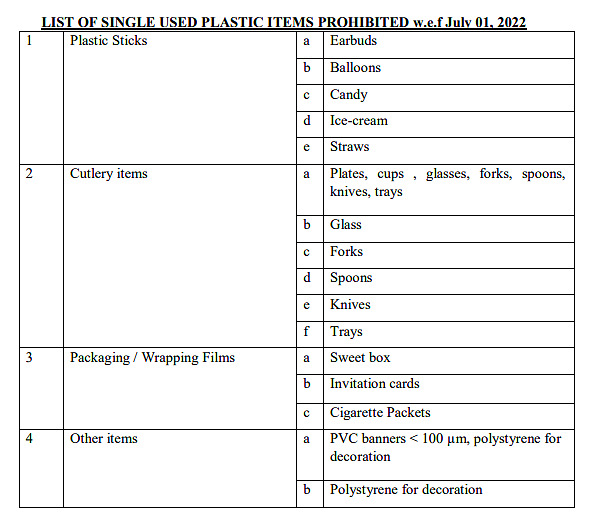
views
When you visit the nearest market next month, be sure to look around. Are the beverages still being served with plastic straws and stirrers, and are your favourite candies wrapped around plastic sticks? Are the sweet boxes still packaged in transparent plastic films? And is plastic cutlery lying on the table outside an eatery? If not, then be sure that India has finally begun its long battle to eliminate single-use plastic.
Almost four years after Prime Minister Narendra Modi vowed to phase out single-use plastic, the country is now all set to take its first step. Starting July 1, manufacture, stocking, import, distribution, sale and use of as many as 19 items of ‘low utility and high littering value’ will be banned across all states. These banned items include straws, stirrers, ear buds, candies, balloons with plastic sticks, cutlery, cigarette packs, packaging films and polystyrene (thermocol) for decoration.
“We are eating, drinking, breathing plastic every day. It has been choking our ecosystem, our oceans and wildlife for years, but now we can see how it is impacting human health. New evidence shows it has even entered our blood stream. Plastic is not simply about litter, but also about the toxic chemicals it contains and it is time that we take some strong action,” says Satish Sinha of the Delhi-based environmental group Toxics Link, which works on issues of waste and chemicals.

The average Indian uses 10 kg of plastic annually. For a country that is swamped with a whopping 3.5 million tonnes of domestic plastic waste generated every year, stemming the flow of just 19 items does not seem like a daunting challenge at first. But the stiff resistance from the industries across the board beseeching the government to postpone the ban tells a different story.
“The situation is dire,” says Vinod Kumar, president of India SME Forum, a non-profit group which has been supporting small and medium-scale industries since 2011. There are concerns that the ban will push close to 1 lakh smaller units recovering from the pandemic’s impact to either lay off their workers or face closure.
“Our units are struggling to procure new machinery, because the existing ones cannot be re-calibrated/modified. There are outstanding loans for old machinery that is now junk. Most of these loans might end up as non-performing assets (NPAs). The bigger companies still have facilities, and infrastructure to make the transition. We are also willing to make the change. The work too has begun on war footing, but at least give us some additional time and support to prepare,” shares Kumar.
As per the data, India’s plastic industry employs about 4 million people and comprises more than 60,000 processing units, 92% of which are MSMEs. The sector will be hit hard, and has been urging the government for a staggered ban, permission to manufacture for the purpose of export only and a financial package to make the transition.
There are also concerns over the supply of existing stock of products, and those manufactured till June 30 before the ban come into effect.
Experts agree that most of the burden of implementation has fallen on the MSME sector, and contend that the government will perhaps need to handhold the sector to make the changeover. “There needs to be more consultations and dialogue over the possible solutions, and how they can be executed. There are definitely some design changes in product packaging, that the industry must look at to address their current challenges,” says Dr Suneel Pandey, senior fellow & director, Environment & Waste Management at TERI.
Then there are major companies like Amul, Dabur and Parle who are leading the charge in imploring the environment ministry to defer the ban to as long as 18 months to set up the required infrastructure and import the necessary raw materials, with their biggest challenge being paper straws.
According to Dr Praveen Aggarwal, CEO of industry body Action Alliance for Recycling Beverage Cartons (AARC) which represents some of these companies, there is a global shortage of quality paper straws, and domestically, India does not have enough capacity to produce.
“With several countries moving to paper straws, there is a global shortage. There is a need for 30 billion, against the available capacity of just 20 million. We are willing to import, but even after paying five times the price, we will not be able to meet even 25% of our requirement,” he says.
The companies are now scrambling to import paper straws, while still urging the government to push the deadline further.
“It is reprehensible,” says Bharati Chaturvedi, founder-director of Chintan Environmental Research and Action Group with palpable angst. “The call to end single-use plastic was given in 2018, the Plastic Waste Management (Amendment), 2021 was notified in August last year. Prior to that, there was a 60 days’ period to comment on the draft. There was enough time to prepare. And none of these items are so difficult to replace with sustainable alternatives. If they could not put the necessary infrastructure in place in all these years, how a few months’ extension will make any difference.”
As the date draws closer, the government has exuded confidence that the arrangements are in place. A mobile app has been launched by the Central Pollution Control Board (CPCB) to allow people to complain against use of single-use plastic. A single window facility has also been created for states/UTs to submit fortnightly reports on field inspection of manufacturers, sellers and users.
Speaking to News18, a senior environment ministry official said the government is well-prepared to implement the ban starting July 1. “Any kind of transition is accompanied by a certain resistance to change. The alternatives are available, and it was important to give a necessary policy and regulatory push to scale up their use,” he says.
Meanwhile, the Central Pollution Control Board (CPCB) has directed its state agencies to cancel the existing commercial licenses of any entities which is found selling the banned items. The Customs authority has been asked to stop the import of these items, and petrochemical industries have been directed to stop the supply of plastic raw materials to industries engaged in the production of these items.
With this ban coming into effect, India will join more than 60 countries that have already introduced measures to curb single-use plastics waste. But implementation is the key, and it remains to be seen is how well the government monitors and enforces this ban to meet the goal that it has set out to achieve.
Read all the Latest News , Breaking News , watch Top Videos and Live TV here.



















Comments
0 comment